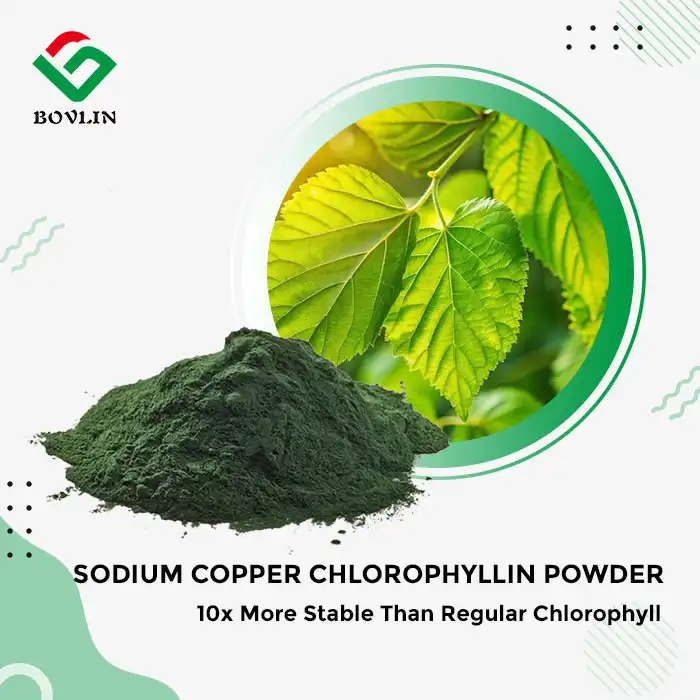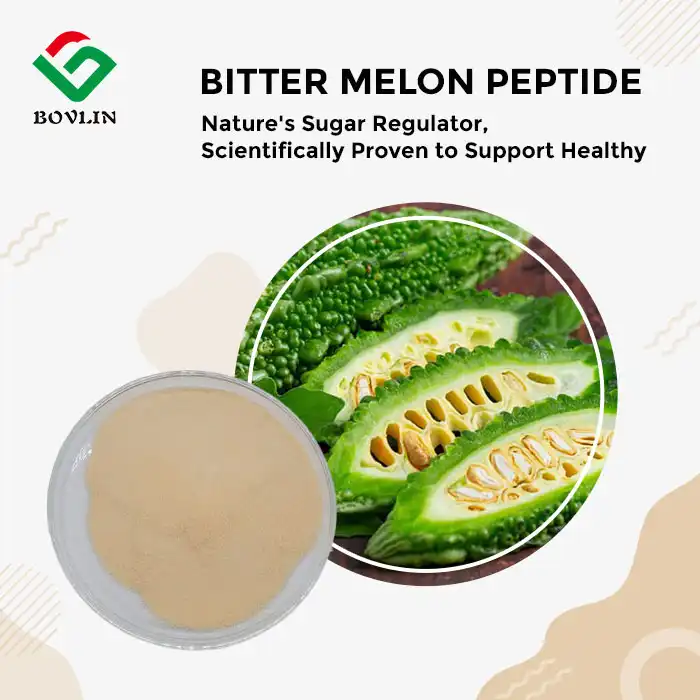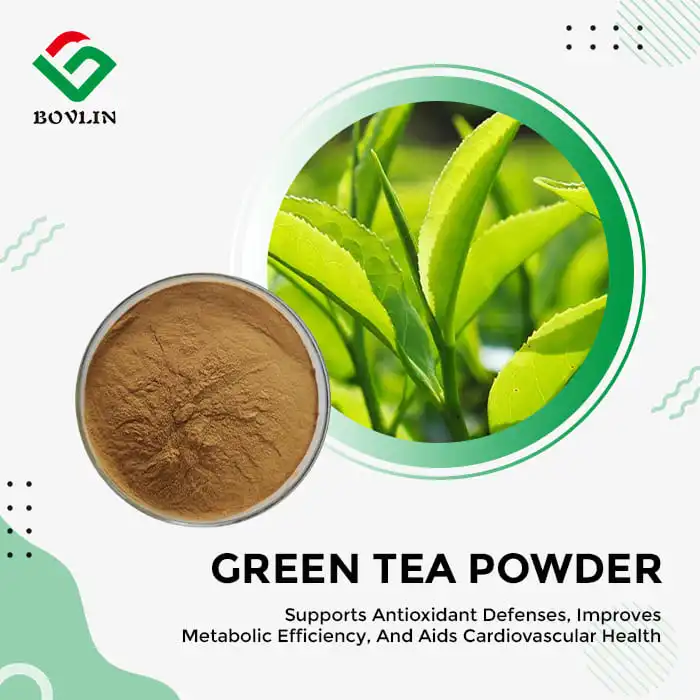How Sea Buckthorn Fruit Powder Supports Heart Health and Blood Circulation Naturally?
Cardiovascular health represents one of the most critical areas in functional nutrition development. Sea buckthorn fruit powder supports heart health and blood circulation through its exceptional bioactive composition. This powder delivers a unique combination of omega fatty acids, including the rare omega-7 (palmitoleic acid), alongside potent polyphenols, flavonoids, and vitamins. These compounds work synergistically to regulate lipid metabolism, reduce harmful cholesterol levels, protect vascular tissues from oxidative damage, and improve endothelial function. Clinical research demonstrates that sea buckthorn bioactives enhance microcirculation, support arterial elasticity, and modulate inflammatory pathways linked to cardiovascular disease. For manufacturers developing heart health supplements and functional foods, this ingredient provides a comprehensive, evidence-based solution aligned with the growing global demand for natural cardiovascular support ingredients.
What Bioactive Compounds in Sea Buckthorn Aid Cardiovascular Function?
The cardiovascular benefits of sea buckthorn fruit powder stem directly from its complex phytochemical profile. Understanding these specific bioactive compounds enables manufacturers to develop targeted formulations with credible health claims. This section examines the key molecular components that make this powder a scientifically validated ingredient for heart health applications.
Omega Fatty Acids and Their Cardioprotective Mechanisms
Sea buckthorn berry powder contains a rare and comprehensive omega fatty acid profile. This profile includes all four primary omegas: omega-3, omega-6, omega-7, and omega-9. The presence of omega-7 (palmitoleic acid) is particularly significant. This fatty acid comprises 20-40% of the oil fraction in sea buckthorn berries. Research indicates omega-7 provides multiple cardiovascular benefits:
- Lipid Regulation: It improves lipid metabolism by modulating hepatic lipogenesis and fatty acid oxidation pathways.
- Insulin Sensitivity: Studies show it enhances insulin signaling, reducing metabolic risk factors for cardiovascular disease.
- Anti-Inflammatory Action: Omega-7 reduces C-reactive protein (CRP) and other inflammatory markers associated with atherosclerosis.
The omega-3 (alpha-linolenic acid) content further supports cardiovascular function through anti-arrhythmic effects and blood pressure regulation. Together, these fatty acids create a comprehensive cardioprotective matrix. This makes the ingredient valuable for products targeting metabolic syndrome and cardiovascular wellness.
Polyphenols and Flavonoids for Vascular Health
The polyphenolic compounds in sea buckthorn powder play a crucial role in vascular protection. These plant-derived antioxidants directly influence blood vessel health through multiple pathways. Key polyphenols include:
- Quercetin: This flavonoid enhances endothelial nitric oxide production and reduces oxidative stress in arterial walls.
- Isorhamnetin: Research demonstrates its ability to inhibit LDL oxidation, a critical step in atherosclerotic plaque formation.
- Catechins: These compounds improve vascular reactivity and reduce endothelial dysfunction.
- Proanthocyanidins: They strengthen capillary walls and reduce vascular permeability.
Scientific studies document total polyphenol concentrations ranging from 500-1,500 mg/100g in quality sea buckthorn powder. These compounds neutralize reactive oxygen species that damage endothelial cells. They also modulate gene expression related to vascular inflammation. For manufacturers, this polyphenolic density enables robust antioxidant and vascular health claims backed by peer-reviewed research.
Vitamins and Minerals Essential for Heart Function
Beyond fatty acids and polyphenols, organic sea buckthorn powder provides critical micronutrients for cardiovascular health. The vitamin and mineral content supports multiple aspects of heart function:
- Vitamin E (Tocopherols): Protects LDL cholesterol from oxidation and maintains arterial wall integrity. Sea buckthorn provides 10-30 mg/100g.
- Vitamin C: Essential for collagen synthesis in blood vessels. Concentrations can reach 200-1,500 mg/100g, supporting vascular structure.
- Vitamin K: Plays a role in preventing arterial calcification by activating matrix Gla protein.
- Potassium: Supports healthy blood pressure regulation through sodium balance and vasodilation mechanisms.
- Magnesium: Critical for proper cardiac muscle contraction and rhythm regulation.
This micronutrient profile complements the fatty acid and polyphenol content. It creates a complete nutritional package for cardiovascular support. Manufacturers can leverage this comprehensive composition to position products as holistic heart health solutions.
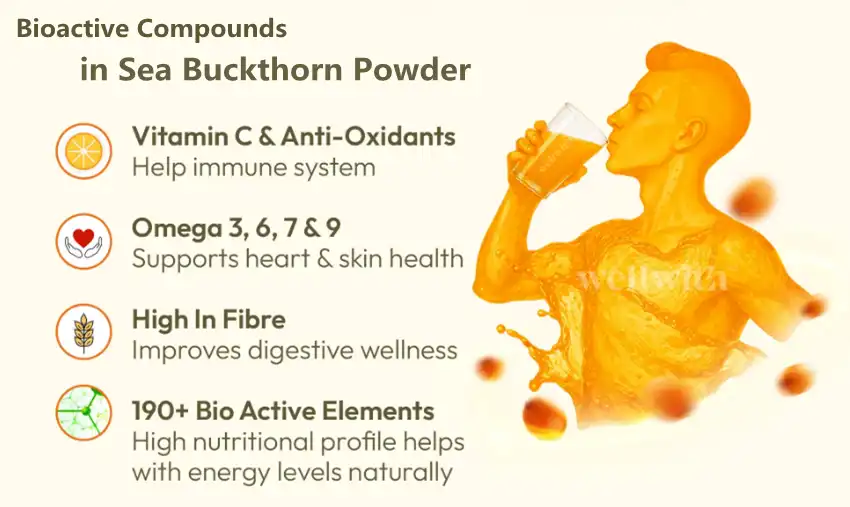
Regulating Lipid Metabolism and Reducing Cholesterol Levels
Dyslipidemia - abnormal levels of blood lipids - represents a primary risk factor for cardiovascular disease. Sea buckthorn fruit powder has been extensively studied for its lipid-modulating properties. The bioactive compounds within this ingredient influence cholesterol synthesis, absorption, and clearance. This section examines the mechanisms and clinical evidence supporting its use in lipid management formulations.
Mechanisms of Cholesterol Reduction
The cholesterol-lowering effects of sea buckthorn berry powder operate through several well-documented mechanisms. Research has identified multiple pathways through which its bioactive compounds reduce harmful cholesterol levels:
- HMG-CoA Reductase Modulation: Certain phytosterols and polyphenols in sea buckthorn influence this rate-limiting enzyme in cholesterol synthesis.
- Bile Acid Binding: Fiber components and plant sterols increase fecal excretion of bile acids, forcing the liver to use cholesterol for bile acid synthesis.
- LDL Receptor Upregulation: Omega fatty acids and flavonoids enhance hepatic LDL receptor expression, increasing cholesterol clearance from blood.
- Antioxidant Protection: By preventing LDL oxidation, sea buckthorn compounds reduce the formation of oxidized LDL, which is more atherogenic than native LDL.
Studies demonstrate that the synergistic action of these mechanisms produces measurable reductions in total cholesterol and LDL cholesterol. For manufacturers developing cholesterol management products, this multi-pathway approach offers significant advantages over single-mechanism ingredients.
Triglyceride Management and HDL Enhancement
Beyond cholesterol reduction, sea buckthorn powder positively influences other critical lipid markers. High triglyceride levels and low HDL (high-density lipoprotein) cholesterol are independent cardiovascular risk factors. Sea buckthorn addresses both:
Triglyceride Reduction:
- The omega-7 content specifically targets hepatic triglyceride production.
- Studies show reductions of 15-25% in serum triglycerides with regular sea buckthorn supplementation.
- Omega-3 fatty acids enhance lipoprotein lipase activity, accelerating triglyceride clearance.
HDL Enhancement:
- Research indicates modest but significant increases in HDL cholesterol levels.
- The mechanism involves increased apolipoprotein A-I synthesis and reverse cholesterol transport activation.
- Higher HDL levels facilitate the removal of cholesterol from peripheral tissues back to the liver.
The improvement in the total cholesterol/HDL ratio represents a particularly important cardiovascular risk indicator. Products formulated with sea buckthorn can address comprehensive lipid profile optimization, not just isolated cholesterol reduction.
Clinical Evidence Supporting Lipid Profile Improvement
The lipid-modulating effects of sea buckthorn are supported by substantial clinical research. Multiple human intervention studies have documented significant benefits:
A randomized controlled trial published in the European Journal of Clinical Nutrition examined overweight individuals consuming sea buckthorn daily. Results showed:
- Significant reductions in total cholesterol
- Decreased LDL cholesterol levels
- Improved triglyceride profiles
- Enhanced HDL functionality
Another clinical study focused on participants with metabolic syndrome. The research documented improvements in:
- Fasting blood glucose
- Insulin sensitivity markers
- Lipid peroxidation indicators
- Inflammatory cytokine levels
These studies typically employed dosages ranging from 5-30 grams of sea buckthorn berry material or equivalent extract daily. The duration ranged from 4-12 weeks. For manufacturers, these clinical parameters provide valuable guidance for formulation dosing and claim substantiation. The evidence supports positioning organic sea buckthorn powder as a clinically validated ingredient for cardiovascular and metabolic health products.
Improving Microcirculation and Supporting Vascular Elasticity
Healthy blood circulation depends on both the integrity of blood vessels and the fluidity of blood flow. Sea buckthorn fruit powder supports these aspects through compounds that strengthen vascular tissues, enhance endothelial function, and improve blood rheology. This section explores how these mechanisms translate into practical circulatory benefits for product formulations.
Strengthening Capillary Walls and Endothelial Function
The endothelium - the inner lining of blood vessels - plays a critical role in cardiovascular health. Endothelial dysfunction is an early marker of cardiovascular disease. Sea buckthorn powder contains specific compounds that protect and enhance endothelial function:
- Flavonoids (Rutin and Quercetin): These compounds strengthen capillary walls by stabilizing collagen structures and reducing vascular permeability.
- Vitamin C: Essential for collagen synthesis, it maintains the structural integrity of blood vessel walls.
- Proanthocyanidins: These oligomeric compounds bind to and protect vascular collagen and elastin from enzymatic degradation.
Research demonstrates that sea buckthorn supplementation improves endothelial-dependent vasodilation. This measurement indicates better endothelial function. The bioactive compounds reduce oxidative stress in endothelial cells. They also modulate inflammatory signaling pathways that contribute to vascular dysfunction. For manufacturers developing products for peripheral circulation or age-related vascular decline, these mechanisms provide strong scientific support.
Nitric Oxide Production and Blood Vessel Dilation
Nitric oxide (NO) is a critical signaling molecule in the cardiovascular system. It regulates vascular tone, blood pressure, and blood flow. Sea buckthorn berry powder influences NO bioavailability through several pathways:
- Enhanced eNOS Activity: Polyphenols and omega fatty acids increase the activity of endothelial nitric oxide synthase (eNOS), the enzyme that produces NO.
- Reduced NO Degradation: Antioxidants in sea buckthorn protect NO from degradation by reactive oxygen species, extending its biological half-life.
- Improved Substrate Availability: The amino acid content provides L-arginine, the substrate for NO synthesis.
Studies show that improved NO bioavailability results in:
- Better vasodilation and blood flow
- Lower blood pressure in hypertensive individuals
- Enhanced oxygen and nutrient delivery to tissues
- Reduced platelet aggregation
These effects make sea buckthorn powder valuable for formulations targeting blood pressure support, exercise performance, and cognitive blood flow. The natural enhancement of NO production provides a mechanism distinct from pharmaceutical vasodilators.
Anti-Platelet and Blood Flow Enhancement Properties
Blood viscosity and platelet aggregation significantly impact cardiovascular risk. Excessive platelet clumping can lead to thrombosis and arterial blockage. Organic sea buckthorn powder contains compounds that improve blood rheology:
- Omega-3 Fatty Acids: These reduce platelet aggregation by modulating thromboxane and prostacyclin balance.
- Flavonoids: Compounds like quercetin inhibit platelet activation through multiple signaling pathways.
- Vitamin E: Reduces platelet adhesion to endothelial cells and modulates platelet membrane fluidity.
Research demonstrates that sea buckthorn consumption:
- Reduces platelet aggregation in response to various agonists
- Decreases blood viscosity markers
- Improves red blood cell deformability
- Enhances overall microcirculatory blood flow
These anti-thrombotic effects complement the lipid-lowering and antioxidant properties. They create a comprehensive cardiovascular protection profile. For manufacturers, this enables multi-faceted product positioning addressing circulation, blood flow, and thrombotic risk factors. The ingredient's safety profile makes it suitable for long-term preventive health applications.
Conclusion
Sea buckthorn fruit powder represents a scientifically validated, multi-mechanism ingredient for cardiovascular health formulations. Its unique bioactive profile - featuring comprehensive omega fatty acids, potent polyphenols, and essential cardiovascular vitamins - addresses key pathways in heart disease prevention. The evidence supports its efficacy in regulating lipid metabolism, reducing cholesterol and triglycerides, enhancing HDL function, and protecting vascular tissues from oxidative damage. Additionally, its ability to improve microcirculation, support endothelial function, and modulate blood flow makes it valuable for comprehensive cardiovascular support products. For manufacturers seeking natural, evidence-based ingredients for heart health applications, sea buckthorn powder offers exceptional formulation value and strong claim substantiation potential.
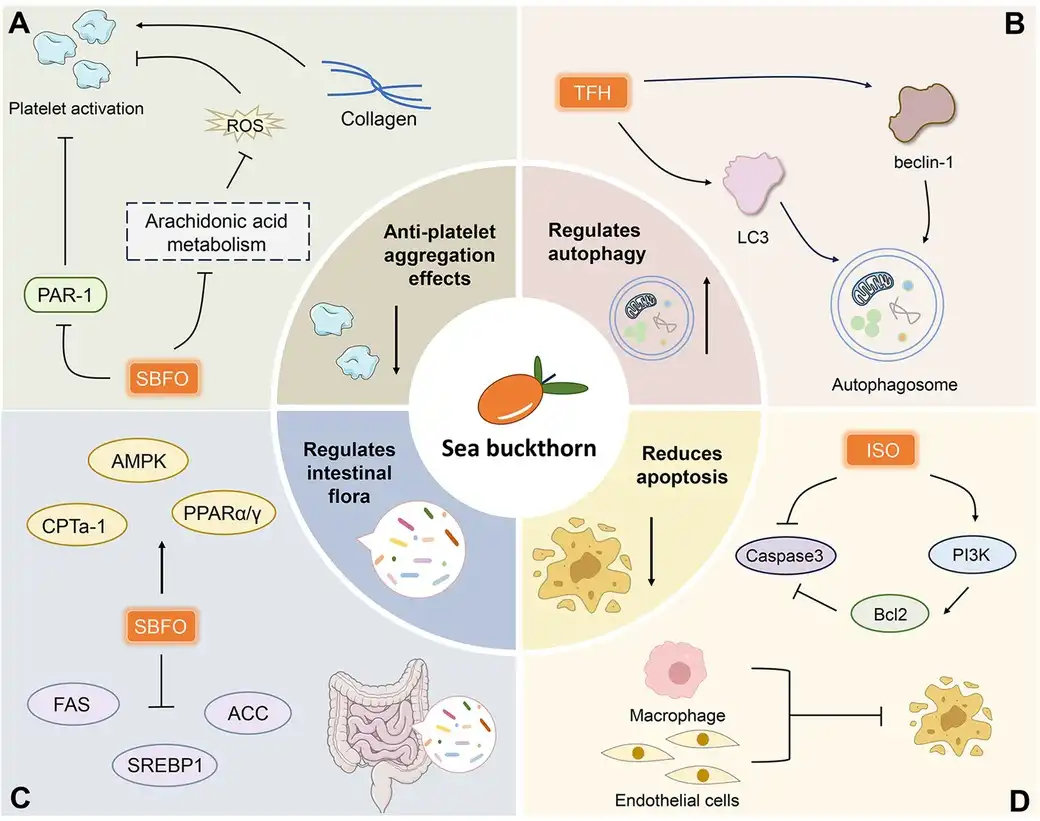
FAQs
What clinical dosages have been studied for cardiovascular benefits?
Clinical studies examining the cardiovascular effects of sea buckthorn have used dosages ranging from 5-30 grams of berry material daily, or equivalent standardized extracts. Most studies showing significant lipid profile improvements used 10-20 gram daily dosages over 4-12 week periods. Manufacturers should consider these ranges when formulating supplements, adjusting for concentration and bioactive standardization. Always conduct stability and efficacy testing for specific formulations.
Can sea buckthorn fruit powder be combined with other cardiovascular ingredients?
Sea buckthorn powder demonstrates excellent synergy with other cardiovascular support ingredients. It is commonly combined with Coenzyme Q10, plant sterols, garlic extract, hawthorn berry, and omega-3 fish oils in comprehensive heart health formulations. The diverse mechanism of action allows for complementary benefits without redundancy. Formulators should evaluate potential interactions and ensure compatibility through stability testing.
What quality markers indicate high-quality cardiovascular-grade sea buckthorn powder?
Premium cardiovascular-grade powder should specify total omega fatty acid content, particularly omega-7 levels. Total polyphenol and flavonoid concentrations should be documented with standardized assay methods. Vitamin C content should be measured and guaranteed. Additionally, low oxidation markers (peroxide value, TBARS) indicate proper processing and storage. Certificates of Analysis should confirm absence of heavy metals and pesticides.
Bolin Biotechnology - Your Reliable Manufacturer
Bolin Biotechnology stands as a trusted manufacturer and supplier of premium-grade sea buckthorn fruit powder for nutraceutical and functional food applications worldwide. Our state-of-the-art factory employs advanced processing technology to preserve the full spectrum of cardiovascular-supporting bioactives. We provide comprehensive technical documentation, batch-specific COAs, and formulation support to help you develop effective heart health products. Our quality systems meet international standards, ensuring consistent, traceable ingredients for your most demanding applications. Contact our technical team for samples, specifications, and competitive pricing at sales1@bovlin.com.

References
Johansson, A. K., Korte, H., Yang, B., Stanley, J. C., & Kallio, H. P. (2000). Sea buckthorn berry oil inhibits platelet aggregation. The Journal of Nutritional Biochemistry.
Eccleston, C., Baoru, Y., Tahvonen, R., Kallio, H., Rimbach, G. H., & Minihane, A. M. (2002). Effects of an antioxidant-rich juice (sea buckthorn) on risk factors for coronary heart disease in humans. The Journal of Nutritional Biochemistry.
Larmo, P. S., Yang, B., Hyssälä, J., Kallio, H. P., & Erkkola, R. (2009). Effects of sea buckthorn oil intake on vaginal atrophy in postmenopausal women: a randomized, double-blind, placebo-controlled study. Maturitas.
Yang, B., Kalimo, K. O., Mattila, L. M., Kallio, S. E., Katajisto, J. K., Peltola, O. J., & Kallio, H. P. (1999). Effects of dietary supplementation with sea buckthorn (Hippophaë rhamnoides) seed and pulp oils on atopic dermatitis. The Journal of Nutritional Biochemistry.
Basu, M., Prasad, R., Jayamurthy, P., Pal, K., Arumughan, C., & Sawhney, R. C. (2007). Anti-atherogenic effects of seabuckthorn (Hippophaea rhamnoides) seed oil. Phytomedicine.
Cheng, J., Kondo, K., Suzuki, Y., Ikeda, Y., Meng, X., & Umemura, K. (2003). Inhibitory effects of total flavones of Hippophae rhamnoides L. on thrombosis in mouse femoral artery and in vitro platelet aggregation. Life Sciences.

